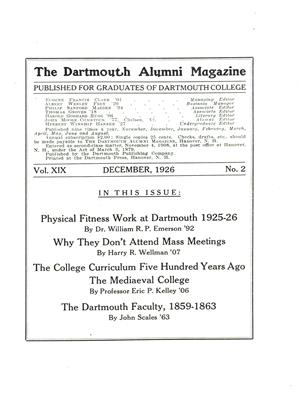Editorials appraising the work of Dr. Tucker and commenting upon his life and character continue to come to the college offices. The following are reprinted from The SpringfieldRepublican and The Hartford Courant:
William Jewett Tucker
(From The Springfield Republican)
William Jewett Tucker, like the late George Harris, came to the presidency of a Connecticut valley college in the nineties from the faculty of Andover Theological seminary. Both were New England men, trained according to the best religious and educational ideals of an earlier day, and both had aligned themselves with a progressive religious outlook before leaving their theological chairs to become the heads of institutions of undergraduate education. The old tradition of selecting college presidents from the ranks of clergymen was abundantly justified when men like George Harris could be called to Amherst and William Jewett Tucker to Dartmouth.
Dr. Tucker developed Dartmouth College on the scale the country knows today. The number of enrolled students when his administration ended was three times what it had been when his administration began. The material expansion was proportionate. Moreover, the Tuck School of Business Administration had been successfully launched. Dr. Tucker had not been eager to assume the presidency of his alma mater; on the contrary, he had twice declined the offer before finally accepting it. But when he felt that he could conscientiously depart from Andover seminary after its period of stress he soon demonstrated that the Dartmouth alumni who had so earnestly desired him to administer the affairs of the college had been guided by a sound understanding of his capacity for leadership.
Dr. Tucker's fame is so closely linked with Dartmouth college that there is danger of overlooking some points of interest in his preliminary career. While at Andover he, with Dr. Harris, had been an editor of the Andover Review and had been a stalwart upholder of the theological liberalism which precipitated the heresv trial. In 1891, two years before he was called" to Dartmouth, he founded the social settlement in Boston known as Andover house, which developed into South End house. Before becoming a teacher of theology he had held a pastorate as important as that of the Madison Avenue Presbyterian church in New York. Dr.- Tucker's talent and character bore fruit in a long and beneficent life.
Dr. William J. Tucker
(From The Hartford Courant)
Dr. William Jewett Tucker, former president of Dartmouth College, who died on Thursday at his home in Hanover, N. H., was a Connecticut boy. He was born at Griswold eighty-seven years ago. Not unnaturally his early religious training and environments were connected with the Congregational church. He went to Dartmouth College and, upon being graduated, entered the ministry. Several years later he accepted the chair of sacred rhetoric in Andover Seminary. Such was his ability and his character that he naturally took a prominent part in those famous and bitter controversies that in their day occupied the interest of the public to an extent that would seem almost unbelievable. Like the future president of Amherst College, Dr George Harris, he was a leading figure in the theological battle.
Three times he was offered the presidency of Dartmouth College. Infrequently, it has been said, has a man been more the unanimous choice of the alumni of a college than was the case m connection with Dr. Tucker. Finally, in 1893, he accepted the position, succeeding Dr. Samuel C. Bartlett, who had resigned, and became the eighth president of the institution which, as its football singers tell the world was founded by Eleazar Wheelock in 1769 There he remained the head until 1909, and Dartmouth rightly feels the great debt it owes him. When he became president the students numbered 323, when he left there were 1,136. Many new buildings were added to the college, the faculty was greatly increased, and other important changes were inaugurated under his direction. But those things, easily to be catalogued, were probably the least important of his years as president. His influence upon young men was great, and his own interests were many and catholic.
Dr. Tucker lived to see the institution developed to an extent it is hardly probable he even imagined could ever be its fortune. He was an honored son by adoption of New Hampshire, and for years he held an enviable position among the educators of the country.
 View Full Issue
View Full Issue
More From This Issue
-
 Lettter from the Editor
Lettter from the EditorEditorial Comment
December 1926 -
 Article
ArticleALUMNI ASSOCIATIONS
December 1926 -
 Article
ArticleTHE COLLEGE CURRICULUM FIVE HUNDRED YEARS AGO THE MEDIEVAL COLLEGE
December 1926 By Professor Eric P. Kelly '06 -
 Article
ArticlePHYSICAL FITNESS WORK AT DARTMOUTH 1925-26
December 1926 By William R. P. Emerson, M. D. -
 Article
ArticleC. F. RICHARDSON'S TRIBUTE TO THE GREAT PRESIDENT
December 1926 -
 Article
ArticleWHY THEY DON'T ATTEND MASS MEETINGS
December 1926 By Harry R. Wellman '07








